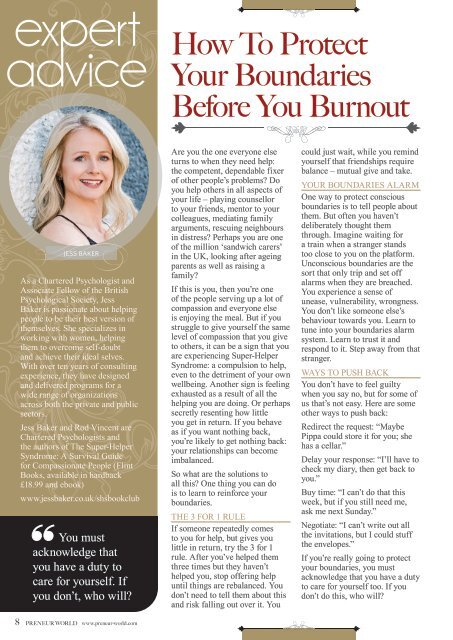Preneur World March 2023
The luxury lifestyle magazine for those with the Preneur MIndset. In this issue: Shania Twain, Florence Pugh, Helen Glover MBE, Active Affluent for full-on outdoor enthusiasts, Luxury Hotels in Dubai and further afield, Minipreneur Fashion, Toys & Books, Techtastic Treats, Fabulous Fizz, Ask The Expert and much more.
The luxury lifestyle magazine for those with the Preneur MIndset. In this issue: Shania Twain, Florence Pugh, Helen Glover MBE, Active Affluent for full-on outdoor enthusiasts, Luxury Hotels in Dubai and further afield, Minipreneur Fashion, Toys & Books, Techtastic Treats, Fabulous Fizz, Ask The Expert and much more.
You also want an ePaper? Increase the reach of your titles
YUMPU automatically turns print PDFs into web optimized ePapers that Google loves.
expert<br />
advice<br />
How To Protect<br />
Your Boundaries<br />
Before You Burnout<br />
JESS BAKER<br />
As a Chartered Psychologist and<br />
Associate Fellow of the British<br />
Psychological Society, Jess<br />
Baker is passionate about helping<br />
people to be their best version of<br />
themselves. She specializes in<br />
working with women, helping<br />
them to overcome self-doubt<br />
and achieve their ideal selves.<br />
With over ten years of consulting<br />
experience, they have designed<br />
and delivered programs for a<br />
wide range of organizations<br />
across both the private and public<br />
sectors.<br />
Jess Baker and Rod Vincent are<br />
Chartered Psychologists and<br />
the authors of The Super-Helper<br />
Syndrome: A Survival Guide<br />
for Compassionate People (Flint<br />
Books, available in hardback<br />
£18.99 and ebook)<br />
www.jessbaker.co.uk/shsbookclub<br />
You must<br />
acknowledge that<br />
you have a duty to<br />
care for yourself. If<br />
you don’t, who will?<br />
Are you the one everyone else<br />
turns to when they need help:<br />
the competent, dependable fixer<br />
of other people’s problems? Do<br />
you help others in all aspects of<br />
your life – playing counsellor<br />
to your friends, mentor to your<br />
colleagues, mediating family<br />
arguments, rescuing neighbours<br />
in distress? Perhaps you are one<br />
of the million ‘sandwich carers’<br />
in the UK, looking after ageing<br />
parents as well as raising a<br />
family?<br />
If this is you, then you’re one<br />
of the people serving up a lot of<br />
compassion and everyone else<br />
is enjoying the meal. But if you<br />
struggle to give yourself the same<br />
level of compassion that you give<br />
to others, it can be a sign that you<br />
are experiencing Super-Helper<br />
Syndrome: a compulsion to help,<br />
even to the detriment of your own<br />
wellbeing. Another sign is feeling<br />
exhausted as a result of all the<br />
helping you are doing. Or perhaps<br />
secretly resenting how little<br />
you get in return. If you behave<br />
as if you want nothing back,<br />
you’re likely to get nothing back:<br />
your relationships can become<br />
imbalanced.<br />
So what are the solutions to<br />
all this? One thing you can do<br />
is to learn to reinforce your<br />
boundaries.<br />
THE 3 FOR 1 RULE<br />
If someone repeatedly comes<br />
to you for help, but gives you<br />
little in return, try the 3 for 1<br />
rule. After you’ve helped them<br />
three times but they haven’t<br />
helped you, stop offering help<br />
until things are rebalanced. You<br />
don’t need to tell them about this<br />
and risk falling out over it. You<br />
could just wait, while you remind<br />
yourself that friendships require<br />
balance – mutual give and take.<br />
YOUR BOUNDARIES ALARM<br />
One way to protect conscious<br />
boundaries is to tell people about<br />
them. But often you haven’t<br />
deliberately thought them<br />
through. Imagine waiting for<br />
a train when a stranger stands<br />
too close to you on the platform.<br />
Unconscious boundaries are the<br />
sort that only trip and set off<br />
alarms when they are breached.<br />
You experience a sense of<br />
unease, vulnerability, wrongness.<br />
You don’t like someone else’s<br />
behaviour towards you. Learn to<br />
tune into your boundaries alarm<br />
system. Learn to trust it and<br />
respond to it. Step away from that<br />
stranger.<br />
WAYS TO PUSH BACK<br />
You don’t have to feel guilty<br />
when you say no, but for some of<br />
us that’s not easy. Here are some<br />
other ways to push back:<br />
Redirect the request: “Maybe<br />
Pippa could store it for you; she<br />
has a cellar.”<br />
Delay your response: “I’ll have to<br />
check my diary, then get back to<br />
you.”<br />
Buy time: “I can’t do that this<br />
week, but if you still need me,<br />
ask me next Sunday.”<br />
Negotiate: “I can’t write out all<br />
the invitations, but I could stuff<br />
the envelopes.”<br />
If you’re really going to protect<br />
your boundaries, you must<br />
acknowledge that you have a duty<br />
to care for yourself too. If you<br />
don’t do this, who will?<br />
8 PRENEUR WORLD www.preneur-world.com







